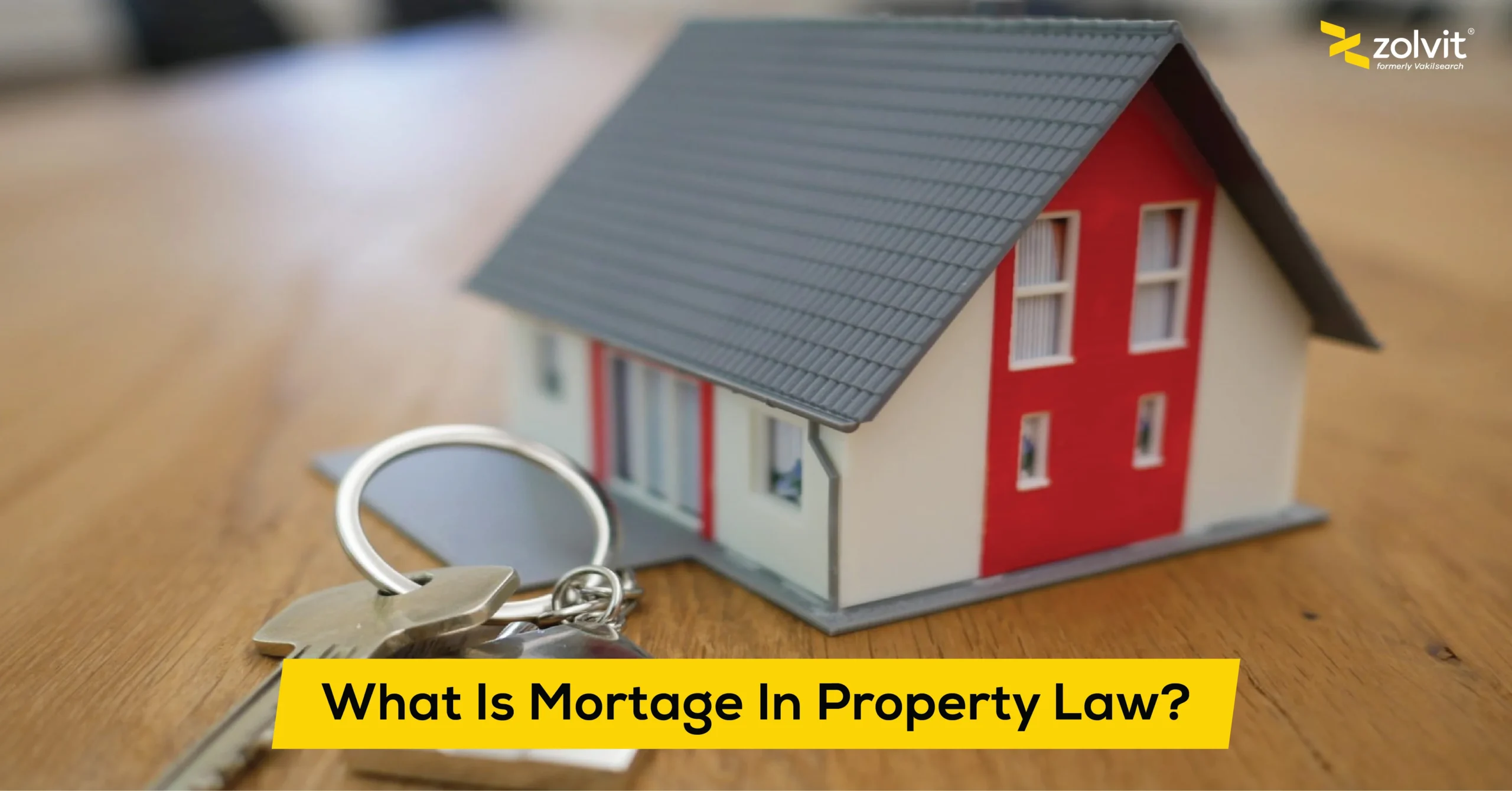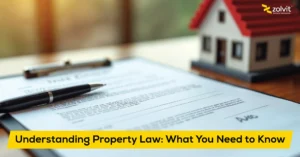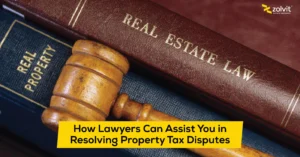In property law, a mortgage is a legal agreement where a lender accepts collateral property from a borrower to guarantee the issuance of a loan. It allows individuals to purchase property with no cash payment. There are various types, including fixed-rate, adjustable-rate, and reverse mortgage, each with its own conditions. Mortgages have benefits such as property ownership and constructing equity, but drawbacks like foreclosure and fluctuating interest rates. Property lawyers are also tasked with drafting and reading mortgage contracts, defending the rights of borrowers.
In this blog you will learn what is mortgage in property law, types of mortgage, legal systems of mortgage, its effects, advantages, drawbacks and challenges, the property lawyer’s role in mortgage and how they can assist you.
Mortgage in Property Law – Definition
A mortgage is a property law agreement in which a borrower puts property as security for a loan. It provides an opportunity for people to borrow money to purchase property without having to pay the full amount in advance. Mortgages play a pivotal role in property transactions, facilitating homeownership and providing security to lenders in the event of default.
Types of Mortgages
There are different mortgages homebuyers can choose from, each designed for different financial situations and needs. Knowing the types of mortgages will help you to select the right one for you. Here are five types of mortgages:
- Fixed-Rate Mortgage: Provides a fixed interest rate and payment amount over the life of the loan
- Adjustable-Rate Mortgage (ARM): Interest rates change over time based on the market
- Reverse Mortgage: For elderly individuals, where they can borrow from their home equity
- Subprime Mortgage: Offered to those with bad credit, typically at a higher interest rate
- Simple Mortgage and English Mortgage: Both involve the borrower mortgaging property to the lender, but with different terms for foreclosure.
Other forms of mortgages are Anomalous mortgages that differ from conventional or typical mortgage arrangements and include unusual conditions.
Legal Framework of Mortgages
A mortgage is formed by a written agreement, and the property of the borrower is taken as security. A mortgage is terminated on repayment of the loan or through foreclosure in case of default of payments. Borrowers are protected by laws against unfair termination of mortgage or oppression.
How Mortgages Are Created
A mortgage is a legal agreement by which a borrower pledges real estate as security for a loan. The creation of a mortgage involves a mortgage deed or agreement, which must meet legal requirements such as adequate documentation, registration, and compliance with local property laws. The lender (mortgagee) has a legal interest in the property until the borrower (mortgagor) pays the loan in full.
Process of Mortgage Termination
Mortgage termination occurs when the borrower fulfills their payment terms. This can be by paying the loan in its entirety, refinancing, or foreclosure in case of default. Upon repayment of the loan, the lenders are required to abandon their legal interest in the property by signing a satisfaction of mortgage or a deed of conveyance, so that the borrower gets full ownership rights.
Legal Protections for Borrowers
There are also legal infrastructures that protect borrowers against abusive lending and transparency of mortgage agreements. Regulations can include disclosure, interest rate caps, foreclosure protections, and prepayment rights. Consumer protection laws protect borrowers against abusive lending, fair treatment, and due process of law in mortgage controversies.
Rights and Liabilities
The rights and liabilities of a mortgagor refer to the legal entitlements and obligations of the borrower who pledges property as security for a loan. Here is a detailed outline of the same:
Rights and Liabilities of Mortgagor
The mortgagor (borrower) has several rights and obligations under a mortgage agreement:
Rights:
- Right to Redeem: The mortgagor has the right to repay the loan in full and reclaim full ownership of the property before foreclosure
- Right to Possession: Unless otherwise agreed, the mortgagor retains possession of the property while repaying the loan.
- Right to Fair Treatment: The borrower is entitled to protection against unfair lending practices and has legal remedies in case of wrongful foreclosure.
Liabilities:
- Loan Repayment Obligation: The borrower must make timely payments as per the agreed terms.
- Maintenance of Property: The mortgagor is responsible for maintaining the property to prevent depreciation.
- Default Consequences: Failure to meet mortgage obligations can lead to foreclosure or other legal actions by the lender.
Rights and Liabilities of Mortgagee
The mortgagee (lender) also has specific rights and obligations:
Rights:
- Right to Foreclosure: If the borrower defaults, the lender can initiate foreclosure proceedings to recover the outstanding debt.
- Power of Sale: In some jurisdictions, lenders may sell the mortgaged property without court intervention if the borrower defaults.
- Right to Interest and Repayment: The mortgagee has the right to receive payments, including principal and interest, as per the mortgage agreement.
Liabilities:
- Fair and Legal Enforcement: The lender must follow legal procedures when enforcing mortgage terms, especially during foreclosure.
- Return of Title Upon Repayment: Once the loan is fully repaid, the lender must release their legal claim on the property.
- Equitable Mortgage Considerations: If an equitable mortgage is in place (where the borrower transfers property rights without formal registration), the lender must adhere to equitable principles and ensure fairness.
Impact of Mortgages on Property Ownership
Mortgages impact property ownership by encumbering the property as collateral for a loan, limiting the owner’s ability to sell or transfer it without lender approval. Here is a detailed impact of the same:
Ownership Rights During the Mortgage Term
Throughout the mortgage period, the property remains in the ownership of the borrower but with a legal interest in it held by the lender as security. The mortgagor is entitled to occupy, use, and improve the property, subject to the terms of the mortgage. Any major alterations that impact the value of the property might need the approval of the lender.
Impact on Property Transfer and Sale
A mortgaged property is transferable, but the mortgage usually has to be paid before the property is transferred. The borrower can pay off the outstanding loan balance from the proceeds of the sale, or the buyer can take over the current mortgage with the approval of the lender. Borrowers can also refinance their mortgage to obtain favorable terms prior to selling. All these alternatives allow the lender’s financial interest in the property to be safeguarded while facilitating transactions in the property.
Consequences of Default and Foreclosure
Defaulting on a mortgage can have severe repercussions, such as foreclosure, which causes the borrower to lose ownership and incur a negative credit score. In default, the lender can take possession of the property as collateral and sell it to recover the defaulted loan amount. Borrowers might opt to restructure or refinance their loan repayment conditions to prevent foreclosure and maintain ownership of the property.
Benefits of a Mortgage
A mortgage allows individuals to purchase property without paying the full amount upfront, spreading the cost over time. It also provides potential tax benefits and helps build equity as the loan is paid down. The 3 major benefits are outlined below:
Tax Benefits: Mortgage interest payments may be deductible, reducing your taxable income.
Builds Your Credit: Timely mortgage payments improve your credit score over time.
Low Interest Rates: Mortgages often offer lower interest rates compared to other types of loans.
Full Home Ownership: With a mortgage, you can eventually own your home outright after completing payments.
Building Equity: As you pay off the mortgage, you gradually increase your ownership stake in the property.
Flexibility: Mortgages can come with flexible terms and repayment options to suit your needs.
Longer Tenure: Mortgages typically have longer repayment periods, making monthly payments more affordable.
Low-Interest Mortgage Debt: Mortgage debt generally carries lower interest rates compared to credit cards or personal loans.
Affordable Homeownership: Mortgages make homeownership more affordable by spreading out the cost over time.
Appreciation in Property Value: Real estate typically appreciates, increasing the value of your investment over time.
Balance Transfer Facility: You can transfer your mortgage balance to a lender offering better terms or rates.
Benefits for First-Time Home Buyers: Special programs often provide lower interest rates or down payment assistance.
- Capital Appreciation: As the property value increases, the equity in your home grows.
- Easy to Repay: Mortgages often offer structured payment plans that are manageable for most borrowers.
- No Prepayment Charges: Many mortgages allow you to repay early without facing extra fees or penalties.
- Enabling Property Ownership: Mortgages allow borrowers to purchase property while avoiding the financial strain of upfront payments.
- Avoiding Foreclosure: Restructuring or refinancing a mortgage helps borrowers avoid foreclosure and maintain ownership.
- Financial Leverage and Investment Opportunities: Mortgages provide the ability to invest in other ventures while securing a property, offering potential returns.
- Building Equity Over Time: Regular mortgage payments increase homeownership equity, which can be used for future financial goals.
Common Risks and Challenges with Mortgages
Mortgages involve a number of risks and challenges such as the threat of foreclosure in case of default payments and shifting interest rates that may result in higher monthly repayments. Buyers can also face long-term debt or a change in economic conditions.
Interest Rate Risks
- Impact of Unstable Interest Rates: Unstable interest rates can affect the viability of mortgages, especially for homeowners with adjustable-rate mortgages (ARMs)
- Effect of Interest Rate Increases: When interest rates rise, mortgage payments may become excessively large, putting a strain on family budgets
- Challenges with Fixed-Rate Mortgages: Homeowners with fixed-rate mortgages may still face issues if they start with a high rate and are unable to refinance to a lower rate
- Importance of Financial Planning: Proper financial planning and selecting appropriate loan terms can help prevent issues related to unstable interest rates.
Default and Foreclosure Risks
- Missed Mortgage Payments: Missing payments can lead to mortgage default and increase the risk of foreclosure
- Causes of Difficulty in Payment: Economic downturn, job loss, or unexpected financial hardships can make mortgage payments challenging
- Consequences of Foreclosure: Foreclosure results in the loss of homeownership and damages the borrower’s credit score
- Impact on Future Loans: A bad credit score increases the difficulty of securing loans in the future
- Lender Alternatives: Lenders may offer solutions like loan modifications or refinancing to help borrowers avoid foreclosure.
Negative Equity and Underwater Mortgages
- Negative Equity: Occurs when the mortgage amount exceeds the current market value of the property, also known as being ‘underwater’
- Causes of Negative Equity: Can result from falling property prices, recession, or unfavorable loan terms
- Impact on Borrowers: Negative-equity borrowers face difficulty in selling or refinancing their properties, leading to financial distress
- Mitigation Strategies: Borrowers may restructure loans or wait for the market to recover to reduce the impact of negative equity.
How Property Lawyers Can Help with Mortgage Issues
Mortgage attorneys can assist with loan problems by providing legal counsel on mortgage agreements, negotiating fair terms, and representing in the event of a dispute or foreclosure proceeding. They can also assist in negotiating the complexities of property laws and protecting the rights of the borrowers.
Legal Guidance and Borrower Protection
Property lawyers provide significant legal guidance to borrowers, keeping them informed about their obligations and rights under mortgage agreements. Lawyers help in establishing unfair loan terms, reviewing terms of agreement, and issuing legal advice in terms of redress in event of financial emergency. Through analysis of mortgage settlement avenues for dispute, lawyers help borrowers resolve issues with lenders and defend their rights.
Negotiating with Lenders
A property lawyer can negotiate on behalf of the borrowers with lenders for modifying the terms of the loan, obtaining favorable interest rates, or arranging other payment modes. Property lawyers advise clients to opt for refinancing, restructuring the loan, or forbearance in order to prevent foreclosure. On the basis of legal expertise, they counsel the borrowers that they deserve fair treatment and need to meet the conditions defined by authorities in negotiations.
Foreclosure Defense and Legal Representation
In foreclosure cases, property lawyers represent borrowers by identifying potential legal defenses to foreclosure, such as lender misconduct, flawed documentation, or failure to comply with foreclosure statutes. Legal representation ensures borrowers receive complete procedural safeguards and assists them in dealing with complex foreclosure processes.
Role of Property Lawyers in Mortgage Agreements
A property lawyer plays a pivotal role in mortgage deals by ensuring the process is legally sound and protecting the lender’s and borrower’s interests. Their expertise plays a key role in activities such as title verification, contract negotiation, and dispute resolution, minimizing risks and allowing a smooth transaction.
Principal functions of a property attorney in mortgage transactions:
- Title verification: Performing detailed title searches to validate ownership and reveal any legal concerns or encumbrances that can impact the mortgage.
- Contract review and negotiation: Examining the mortgage contract to protect the borrower’s interests and verify legal compliance.
- Legal advice: Advising on mortgage terms, risks, and rights during the process.
- Closing assistance: Accompanying the borrower at closing, ensuring accurate document execution and resolving issues.
- Dispute resolution: Helping to settle disputes with the lender, either by negotiation or litigation.
Why hiring a property lawyer for mortgage contracts is important:
- Protection against legal risks: A lawyer assists in revealing possible legal problems with the property and makes sure the mortgage is so structured as to avoid risks.
- Understanding complicated terms: Lawyers clarify the terms written in the mortgage contract and their implications.
- Representing the interests of the borrower: A lawyer negotiates for terms such as interest rates, charges, and payment terms.
Conclusion:
To conclude, a mortgage is a basic principle of property law, providing a means of obtaining loans by the pledge of property. It creates a clear legal relationship between the lender and borrower, defining rights, obligations, and safeguards for both. Knowing the various types of mortgages, their effect on property ownership, and the law governing them is essential for all those dealing in real estate transactions. Whether you are a borrower looking for financial assistance or a lender evaluating risk, understanding the complexities of mortgages ensures that you make informed decisions and safeguard your interests. With proper legal knowledge and prudent consideration, mortgages can be an effective instrument in financing, but they must also be managed responsibly to prevent issues in the future.
- A mortgage is a legal agreement where a borrower pledges property as collateral to secure a loan, allowing the lender to take possession if the borrower defaults
- There are various types of mortgages, including simple mortgages, usufructuary mortgages, and equitable mortgages, each with different terms and conditions
- The lender holds a lien on the property, but the borrower retains ownership and can use or sell the property, as long as the loan is repaid according to the agreed terms
- Mortgages are governed by property law and specific acts, such as the Transfer of Property Act in India, which outlines the rights, duties, and responsibilities of both parties
- A mortgage affects the property’s title, and any transfer or sale of the property must address the outstanding mortgage, as it remains attached to the property until fully paid off.
FAQs Related to Mortgage In Property Law
How do you pay a mortgage?
A mortgage is paid in monthly installments, consisting of both principal (the borrowed amount) and interest. The tenure of the loan term may vary such as 15, 20, or 30 years, determining the duration of the payments.
What is the age limit for a mortgage loan?
Lenders usually prefer borrowers to be at least 18 years old (the legal age for entering a contract). Most lenders also prefer borrowers to be under 70-75 years old at the time the loan matures, depending on the loan's duration.
What is the mortgage loan interest rate?
Mortgage interest rates vary based on factors such as the type of mortgage, the borrower’s credit score, and the prevailing market conditions. Interest rates can be either fixed (remaining the same throughout the life of the loan) or adjustable (changing with market interest rates).
What is the role of a mortgage broker?
A mortgage broker acts as an intermediary between the borrower and various lenders. They assist in finding the best mortgage terms, negotiating loan options, and processing the loan application. Brokers have access to a variety of lenders and loan products, which can help borrowers secure better deals.
How do property taxes affect a mortgage?
Property taxes are typically not included in the mortgage loan itself but are often incorporated into the monthly mortgage payment if the lender sets up an escrow account. The lender then pays the property taxes on behalf of the borrower. Failure to pay property taxes can lead to foreclosure under certain circumstances.
Can I change the terms of my mortgage after signing?
While changes can sometimes be made to the terms of your mortgage, this typically requires approval from the lender. Modifications might include refinancing the mortgage, extending the loan term, or adjusting the interest rate, but these changes are subject to lender approval.
What is the difference between a mortgage and the sale of immovable property?
A mortgage is a loan secured against property, where the borrower retains ownership, but the lender has a claim over the property until the loan is repaid. In contrast, the sale of immovable property involves the transfer of full ownership from the seller to the buyer for a price or consideration.





